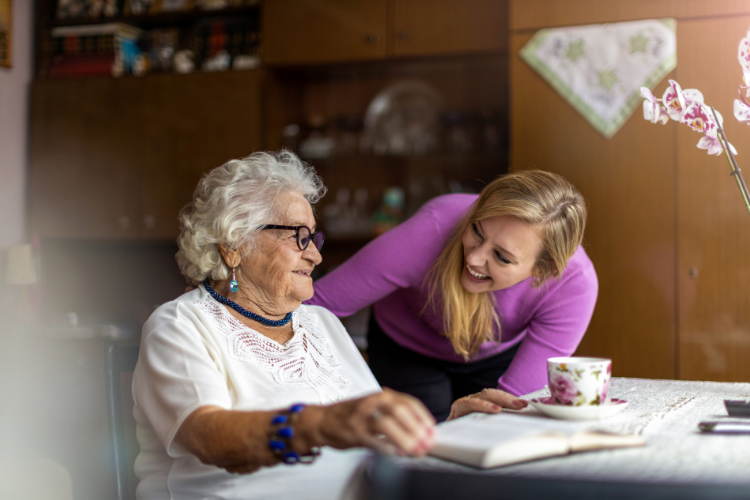In the field of home care, several terms are often used interchangeably, which can create confusion for both families and patients themselves. Especially in French, the terms “garde-malade, aide-soignante, auxiliaire de vie, et dame de compagnie” are often misunderstood or misused. Each term has its own scope and specificities. This lack of understanding of the roles and responsibilities associated with each term can lead to incorrect expectations and, in some cases, an inappropriate choice of care services. In this article, we will demystify these terms, explore their origin and history, and clarify in which contexts and for which needs each is most appropriate.
Caregiver: The Health Companion(“garde-malade”)
The term “caregiver” is often used to refer to someone who assists the sick or elderly in their daily lives. Historically, the role of the caregiver was less regulated and focused mainly on monitoring and patient comfort. It was more about providing reassuring presence than being a qualified healthcare professional. The caregiver can help with medication, meal preparation, and other household chores, but their medical care skills are generally limited.
Nursing Aide: The Pillar of Home Care(“aide-soignante”)
The nursing aide is often considered the pillar of home care, offering a range of services that go well beyond mere assistance. Trained and certified, they are authorized to perform basic medical tasks under the supervision of a qualified healthcare professional. Their role is essential in managing the patient’s daily care, including monitoring vital signs, administering medication, and even more specialized care like dressings. In addition to these technical skills, the nursing aide also provides emotional support, thus helping to improve the patient’s quality of life at home.
Life Assistant: The French Term (“auxiliaire de vie”)
In France, the term “life assistant” is commonly used to refer to professionals who assist people in situations of dependency in their daily lives. Unlike the nursing aide, the life assistant is not necessarily trained to provide medical care, but they play an essential role in maintaining the patient’s independence. They can help with bathing, meal preparation, shopping, and even simple administrative tasks. This term is specific to the French healthcare system and has no real equivalent in Belgium, where responsibilities often fall under the nursing aide. It is therefore important to understand this nuance to avoid any confusion, especially if you are dealing with healthcare systems from different countries.
Companion: More Than Just Presence(“dame de compagnie”
The “companion” is often seen as a less medical figure, focused more on the emotional and social well-being of the person being helped. They are there to provide a reassuring presence, engage in conversations, participate in leisure activities, and in some cases, help with simple household chores. Although the companion is not trained to provide medical care, their role in improving quality of life should not be underestimated. They help break social isolation and maintain a certain level of mental activity, which can be particularly beneficial for the elderly or those suffering from cognitive disorders. This term is more universal and is understood in many countries, although responsibilities may vary.
Why Choose a Certified at “Garde Malade à Domicile” at Home Care
At “Garde Malade à Domicile”, we understand that each term in the field of home care has its specifics and limitations. That’s why we have chosen to work exclusively with certified nursing aides. These healthcare professionals are trained to provide a complete range of services, from medication administration to assistance with daily activities, as well as emotional support. Their comprehensive and rigorous training allows them to assume all the responsibilities associated with the terms caregiver, life assistant, and companion, while guaranteeing a level of care and competence that goes beyond. By using our services, you have the peace of mind of knowing that you or your loved one are in the hands of qualified professionals, capable of meeting a variety of needs with expertise and compassion.
To find out how our certified nursing aides can meet your specific needs, feel free to request a free quote.



